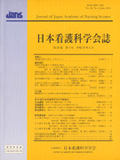Japanese
English
- 販売していません
- Abstract 文献概要
- 参考文献 Reference
- サイト内被引用 Cited by
要旨
目的:頭頸部がんの術後は,社会生活や食生活に影響する様々な障害を抱える.さらに退院後の生活で障害を得た現実に直面し,体験者・家族は苦悩を抱えたまま生活している.本研究では,外来でパターン認識の過程を共に辿ることで,新たに障害を得た老年期頭頸部がん体験者・家族に生じる変化を探求する.
方法:実践的看護研究で解釈学的・弁証法を採用し,Newmanの研究のガイドラインに沿った.参加者は,手術を受け退院後1年以内にある頭頸部がん体験者と家族で,現在困難を抱え研究の趣旨に書面で同意が得られた者である.
結果:70歳前後の通院中の頭頸部がん体験者とその妻4組に2~3回の面談を実施した.頭頸部がんの体験で現在最も関心のある出来事を表出した参加者は,自己洞察から夫婦のパターンを認識し,家族間・他者へのケアリングがみられた.その後,がんサバイバーとして生きる今後の道程を語ると,新たな視点で生きるまでに変容した.
結論:参加者らは,老年期に障害を得てもなお,がんと共に生きる今後の人生を創造するに至った.本看護インターベンションは老年期に新たな障害や困難を抱えた頭頸部がん体験者・家族へのがんリハビリテーション看護,そして通院時の支援としても意義が大きい.
Abstract
Purpose: After the operation of head and neck cancer is which holds various obstacles which influence social life and eating habits. Furthermore, the experience person and the family are faced actually which acquired the obstacle by the life after leaving hospital. So they are living with suffering held. In this study, it searches for changes produced in elderly head and neck cancer survivors and their family that held the new obstacle by following the process of pattern recognition together in outpatient nursing.
Methods: The design of this study is research as praxis. It was hermeneutic and dialectic using Newman's research guidelines. The participants were head and neck cancer survivors who had undergone surgery within one year after leaving hospital, and their family members. All participants gave written informed consent to participation in this study.
Findings: The participants were 4 male survivors in their 70s and their wives. Two-three interviews were performed. Participants expressed the occurrence which is the most interested by experience of the head and neck cancer now. They have recognized husband and wife's pattern from self-insight, and the caring between families and to the others was seen. In the process of pattern recognition, they told the future route which is useful as cancer survivor, and it changed so that it might live with a new viewpoint.
Conclusions: Even if participants acquired the obstacle at the elderly, they came to create the future life which is useful with cancer. This nursing intervention has a large meaning also as the cancer rehabilitation nursing to the experience person with head and neck cancer and their family who held a new obstacle and difficulty at the elderly, and support at the time of going to hospital regularly.
Copyright © 2012, Japan Academy of Nursing Science. All rights reserved.


